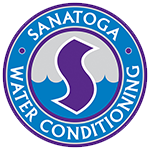Hydrogen Sulfide
A gas that can commonly be found in groundwater, hydrogen sulfide gives off an unpleasant “rotten egg” odor. The odor can be present with a concentration as low as 0.5 parts per million. Hydrogen sulfide can be a by-product of sulfur reducing bacteria utilizing available sulfates in the water. Hydrogen sulfide can also be attributed to water heaters. Many water heaters have a magnesium rod in the tank to prevent corrosion . Dissolved sulfur can react with the magnesium rod causing the formation of hydrogen sulfide . Removing the magnesium rod and replacing it with an aluminum rod can easily solve this; however, this may void the warranty. Hydrogen sulfide can also be naturally occurring from decomposing organic matter such as decaying plants.
Since hydrogen sulfide is a gas, heat forces the gas into the air which is why it is much more noticeable in hot water. In addition to the odor problem, hydrogen sulfide is also a very corrosive to metals, especially iron, steel, copper, and brass. Other aesthetic effects caused by hydrogen sulfide include yellow and black staining on fixtures and laundry, as well as taste and appearances issues with food or beverages made with water containing hydrogen sulfide . Hydrogen sulfide is considered a flammable and poisonous gas; however, it does not usually pose a health risk at concentrations typically found in water sources.
Is Hydrogen Sulfide Regulated?
In the WHO guidelines for drinking-water (WHO, 1993), it is concluded that it is unlikely that anyone could consume a harmful dose of hydrogen sulfide in drinking-water ; thus, no health-based guideline was proposed . However, it was stated that hydrogen sulfide should not be detected in drinking-water by taste or odor, and the taste and odor threshold for hydrogen sulfide in water was considered to be between 0.05 and 0.1 mg/L.
How Is It Tested?
The methods most commonly used to measure hydrogen sulfide in environmental samples, such as air, water , sediment, and sludge , include gas chromatography with flame photometric detection (GC/FPD), gas chromatography with electrochemical detection (GC/ECD) , iodometric methods, the methylene blue colorimetric or spectrophotometric method, the spot method using paper or tiles impregnated with lead acetate or mercuric chloride, ion chromatography with conductivity, and potentiometric titration with a sulfide ion-selective electrode.
Water Treatment Options
Once you have determined you have hydrogen sulfide, there are a couple options for treatment. Low levels of hydrogen sulfides can be removed using an activated carbon filter, which should be changed on a regular basis to maintain a high level of performance. If you suspect sulfate-reducing bacteria , shock chlorination will reduce the bacteria and thus reduce the odor. This is not a permanent solution you may consider a chlorinator, which bleeds chlorine into the water supply continuously . Chlorine acts as an oxidizer and produces sulfur particulates , which can be removed by a sediment filter . There are other oxidizers that can be used such as potassium permanganate .
Aeration is another option to reduce the levels of hydrogen sulfide. Aeration, simply put injects air into the water releasing the hydrogen sulfide gas, which is then vented outdoors. Aeration is used in applications where a large quantity of water is being treated, so not typically a residential application. The thing to remember when treating the water is there are other physical characteristics or unknown contaminants in the water that may impact how effective the treatment may be. This is why it is important to determine the best treatment methods for the type of water being treated.
Contact Sanatoga Water Conditioning To Learn More Or To Schedule A Consultation.
Your Neighbors Love Their Cleaner, Safer, Better Water!
Our dedication to our customers is continually rewarded with referrals and testimonials about our water quality solutions!
